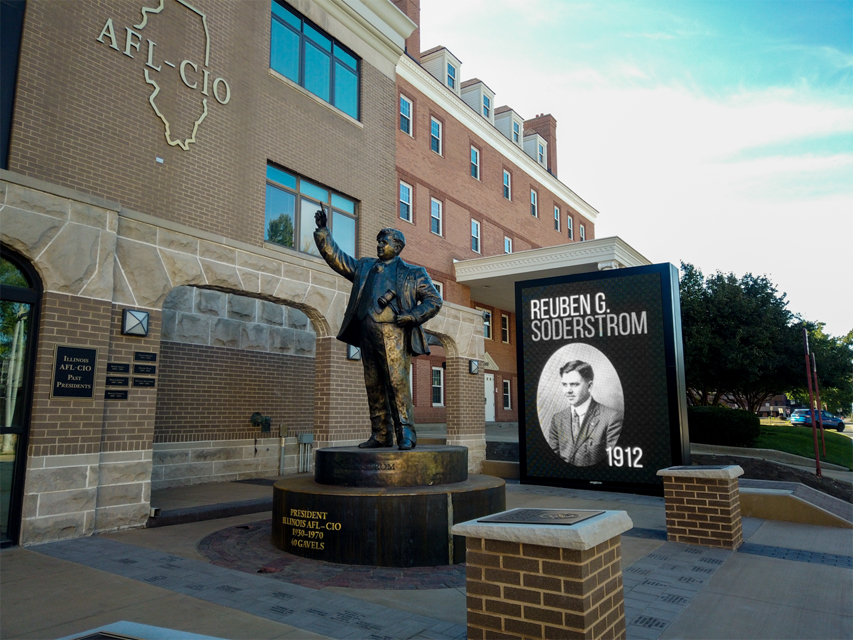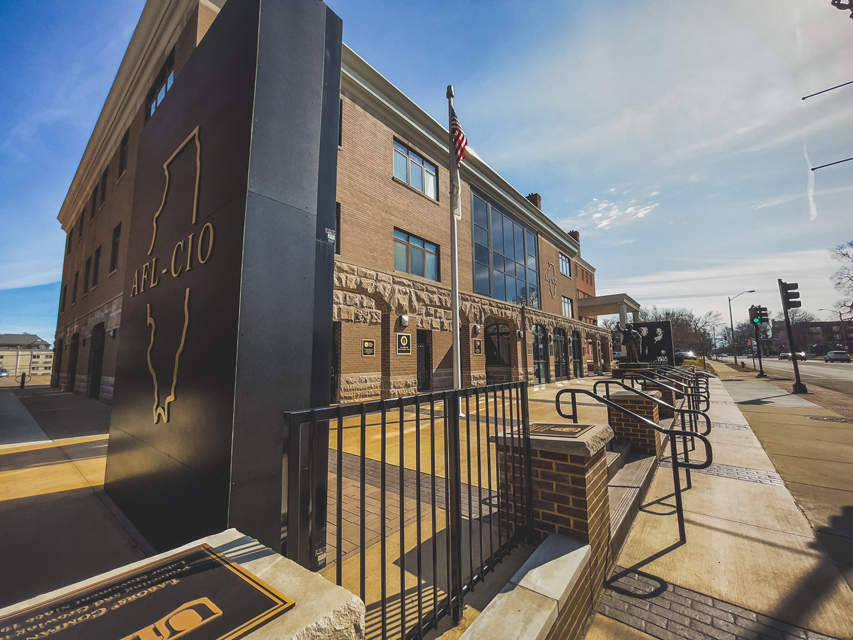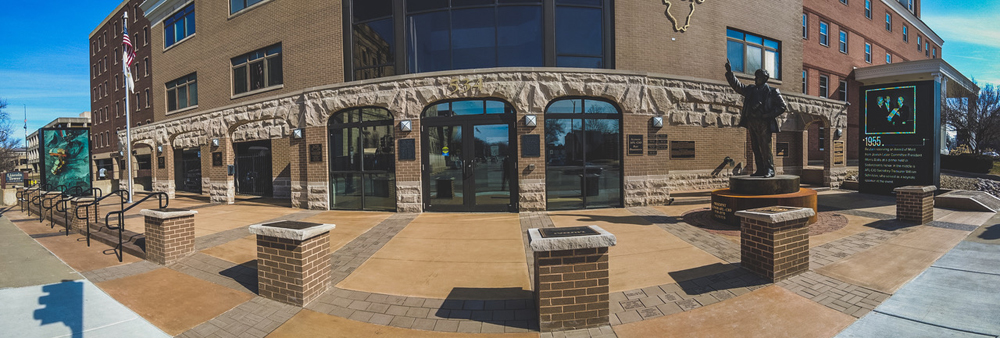Illinois is a very rich labor state, and Reuben Soderstrom is a legend in this field of the state’s history. Not only did Soderstrom work as a newspaper man and serve twice in the state legislature, but he also spent forty years as the president of the Illinois AFL-CIO labor union organization.
Soderstrom’s major accomplishments were many during his Illinois AFL-CIO presidency (lasting between 1930 until his retirement in 1970). He guided the Illinois labor movement through the Depression, through the Second World War, and through the Civil Rights era of the 1960s.
So when his grandson contacted current Illinois AFL-CIO President Tim Drea and offered to donate a bronze statue of Soderstrom created by internationally famed sculptor Lonnie Steward in his honor, that reaching-out began the process of the Illinois AFL-CIO deciding to build a brand-new labor history plaza at their headquarters in Springfield, Illinois with this statute prominently displayed on its grounds. (Note: The statue shows Soderstrom pointing skyward, a pose made famous in a historic photograph taken during his campaign on the back of a flatbed truck for then-vice presidential candidate Franklin D. Roosevelt.)
This project also led to a successful collaboration with a nearby sign company that eventually turned into an investment in two new Watchfire Signs digital displays to complement the new statue and help further tell the fascinating story of Soderstrom to plaza visitors.

Putting Plans into Motion
The new Illinois AFL-CIO plaza, devoted to labor history and its personalities, is prominently located on a historic square within sight of the state capitol building. There were already other monument statues on the Statehouse grounds, including an “Illinois Workers” memorial, “The Coal Miner” memorial, and police and firefighter memorials.
Drea began the plaza construction process by meeting with the architect. “He suggested putting up a fence on each side of our plaza where we could put up and switch out different plaques related to Illinois labor history as we saw fit,” says Drea.
The first problem with this, according to Drea, was that this suggestion ended up looking like a chain link fence at both ends of the long, narrow plaza. The second (and just as major) development was that Drea found out that the fence manufacturer brought onboard was non-union.
The projected $200,000 plaza development was going to be split between the Soderstrom Family Foundation and money raised by the Illinois AFL-CIO members. “We want to support working families, and their dues money is what supports us,” says Drea. “So when we spend their money, we want to make sure we’re employing union contractors.”
With this in mind, Drea turned instead to The Ace Sign Company, also of Springfield. He was familiar with the positive reaction this full-service sign shop had generated from a walkway mural they installed across from a major thoroughfare coming into Springfield. “They have a great reputation here in the area and central Illinois,” he says, “and everything about them spelled out that they were a company we wanted to do business with.”
Scott Bringuet, chief experience officer of The Ace Sign Company, noticed that the chain-link-looking fence wall wasn’t dug deep enough to stand up to the wind and knew the Illinois AFL-CIO wouldn’t want to find plaques attached to it lying on the ground after being blown down. He also thought about how this could be more than just informational plaques that one can walk up to read.
“We started asking ourselves if this could be something that can be appreciated from up close as well as down the road,” says Bringuet. “We brainstormed about how to make it really engaging and how to invite people into the space to learn more. That’s when the digital display application started to become part of the conversation.”
Inspired by the monolithic digital displays at Millennium Park in Chicago, The Ace Sign Company design team drew up the idea of using two 8-by-11-foot 8mm Watchfire digital displays that face each other at opposite ends of the plaza about ninety feet apart. The back side of these multi-functional digital solutions would feature identification for the AFL-CIO on one side of the plaza and, on the end, interpretative information regarding the statue and AFL-CIO throughout the year.
“We were very impressed by what [Scott] told us,” says Drea, “and the next thing you know, we now have two Watchfire signs on our plaza.” (Note: Drea was also excited that union members would be involved with all the construction and installation of the signs.)

Engineering a Solution
Once the display designs and sizes were agreed upon, The Ace Sign Company developed a foundation and steel column detail base, much like they do with most of their freestanding structure creations. “We did that to support the wind load,” says Bringuet.
After breaking ground in October of 2019 (and waiting for weather to improve), the new plaza construction started in April of 2020 and finished in late August.
Construction crews tore out the concrete pads that had existed on-site previously and replaced them with new pavings and bollards, railings, stairs, and pillars across the front façade. Bringuet ended up coordinating with the architect and the general contractor to leave an area of foundation open so they could place foundations for the digital displays and then have the finish poured around them. “This created a really nice, built-in look with the displays so that it appears as though they’re just sitting there on those pavers,” says Bringuet.
Since the plaza is adjacent to a historic zoned area, The Ace Sign Company made sure to follow the signage code in the area. “We proactively approached the city regarding the project, and due to the interest of that area being near the State Capitol building, we were able to get good reception from the city allowing us to do it,” says Bringuet. “We had the same brightness controls we would do for any other sign in the area.
“But one of the things that was made clear proactively by us was the intent of these displays. They would be more image-based and would promote civic and community events and would not to be promoting political affiliations. The city reacted to that very well.”
This project ended up being a two-trip installation for The Ace Sign Company, who worked hand-in-hand with the union contractor last summer.
First, their crew of three handled excavation, boring, and pole-setting. Because of the size of the digital displays, they had to lift them up via a crane from the roadside and slip-mount them onto the poles.
The Story of These Displays
The digital displays are in operation for twelve hours daily starting at seven o’clock in the morning. Watchfire Signs displays are fully encapsulated to seal out moisture and pollutants. “This allows for an exposed diode, so there’s no glare and you get to see the image clearly,” says Bringuet, “but all the components are watertight under that sealant.”
The visual-only Watchfire displays are a mix of signage and artwork. Video content on the displays repeats on fifteen-minute cycles. One display is devoted to the labor story of Illinois (the Haymarket riots, the Cherry mine disaster, and the speech by Dr. Martin Luther King at the AFL-CIO convention in Springfield in October of 1965) and AFL-CIO announcements and messages, while the display nearest the statue acts as its backdrop, featuring content that’s geared toward the legacy of Soderstrom.
“The Watchfire displays are very image-based,” says Bringuet. “Our goal was to create a kind of combination of an artwork installation, in the terms of images that really connect with the purpose of the AFL-CIO and the plaza and then old images that show the timeline of Mr. Soderstrom and his legacy. There are also some content slides as well that have the mission and goals of the AFL-CIO and some of the messages that they put forth on their Web site as well.”
Drea and one of his Illinois AFL-CIO graphic designers handle content creation and management for the displays after learning from a tutorial by Watchfire Signs and The Ace Sign Company.
Since Abraham Lincoln is an icon in the area, the organization programmed a quote from Lincoln about labor on the display. “It’s relatively easy, and everybody gets excited about it,” says Drea. “We have pictures about the history of labor in Springfield and things like that, as well.”
The 8mm displays are also the highest resolution in the Springfield area. “Since they’re in an area where you can walk right up to them, we wanted to make sure that we had a tight pixel pitch for this application,” says Bringuet.

Giving the Displays Their Due
The statue and the new displays were honored in a dedication ceremony for the new labor plaza. Ironically, although the new plaza was designed around the statue, Drea says it was actually the last item to be installed.
The digital signs, the labor history plaza, and the Soderstrom statue garner extra attention as they are located on a T-intersection near a stoplight on the same street as the State Capitol. While COVID-19 concerns have halted general assembly legislative sessions that usually attract even more tourists to the area, hopes are that the content presentation on the displays will ramp up when tourism reopens and people start traveling again.
Drea told reporters last fall that President Soderstrom “left a legacy of tremendous accomplishments and progressive ideals that our generation is working to build on today.” It is proving true that the new statue and Watchfire Signs digital displays are also helping to build on his impressive legacy.
—Jeff Wooten










